 | « Back to article | Print this article |
'Stan's death is the culmination of a series of acts of abominable cruelty on the part of the Indian State.'
Jyoti Punwani attends Monday's online condolence meeting for Father Stan Swamy, the Jesuit priest and respected tribal rights activist, who passed into the ages on Monday.

The mails used to pop up in my inbox from 2009 onwards: Father Stan Swamy's writings in Sanhati, the Web site that has since 2006 been documenting the struggles of the rural poor, posted by one of his admirers.
Going through them today, one can't help but feel that the Jesuit priest writing about the injustices meted out to the Adivasis of Jharkhand, was documenting his own final months.
Father Stan wrote about the way the government -- both at the state and at the Centre -- was helping companies take over Adivasi land to get at the rich resources that lay beneath.
When the Adivasis opposed these takeovers, the State would label them Maoists, arrest them under UAPA, and let them rot in jail on terror charges, he wrote.
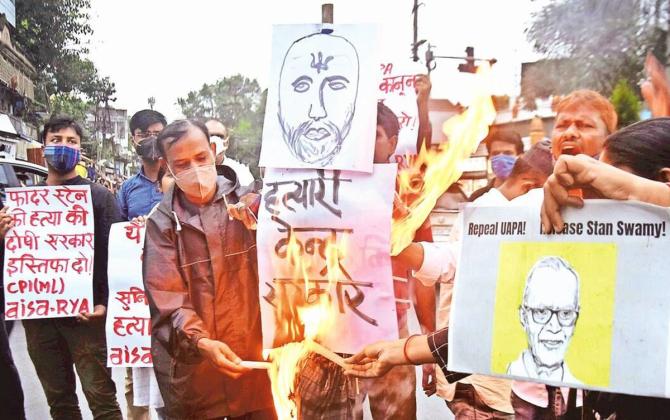
In October 2020, Father Stan, vice-president of the People's Union of Civil Liberties's Jharkhand unit, was arrested under UAPA in the Bhima Koregaon case on the charge of helping Maoists, thrown in a jail far away from his home, and left to rot there.
Even while documenting the State's attempts to bypass laws that protected Adivasis such as the PESA [Panchayats (Extension to Scheduled Areas) Act], and the Forest Rights Act, Father Stan would celebrate the Adivasis' non-violent yet successful fight to keep corporates out.
Alas! We are not in a position to celebrate Father Stan's non-violent resistance to the State that branded him a terrorist at the age of 84, despite having found nothing on him, which led them to conduct as many as three raids on his modest home.
"His home was so small, you could finish searching it in two hours," recalled Mihir Desai, Father Stan's lawyer in the Bhima Koregaon case.
Mihir, who has known Father Stan for 30 years, had stayed with him a number of times in Bagaicha, the institute he had set up for Adivasis, where they learnt about their rights.
Father Stan occupied only one small room in the institute, remembered Mihir. "He had a bed, a chair, a computer, that's it," recalled Siraj Dutta, who worked with him on many campaigns.
It was this simplicity that probably helped him adjust to prison life more smoothly than could be expected of an 84 year old, felt Mihir.
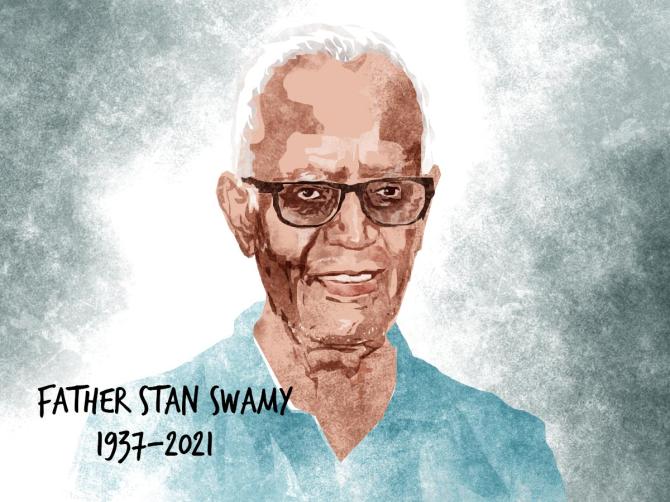
Indeed, Father Stan's initial letters from Taloja Jail (external link) spoke more about the humanity he saw around him than the difficulties he faced: The sipper and straw he used as a Parkinson's patient were misplaced during his arrest and he had to go to court to get them.
The sessions court gave the NIA 20 days to file a reply to his request, an order that retired Supreme Court Justice Madan Lokur described, in an online condolence meeting on Monday evening, as "simply inhuman".
This wasn't the only inhumanity faced by the man who saw humanity all around him even when behind bars.
As economist Jean Dreze put it, "Stan's death is the culmination of a series of acts of abominable cruelty on the part of the Indian State."
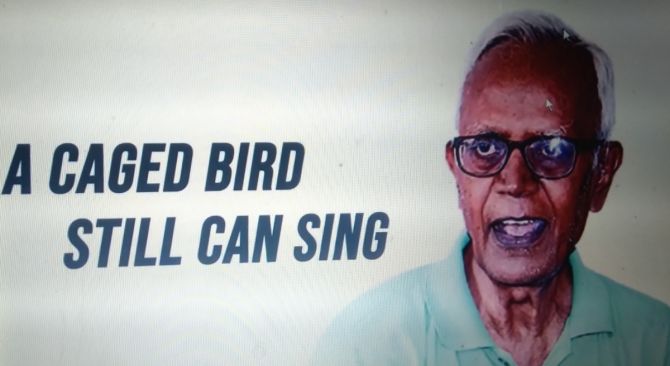
The cessions Court denied him medical bail twice, the first time soon after his arrest when he pointed out that he faced a higher risk from contracting Covid in jail; the second time in March this year when he said that his hearing had deteriorated in jail and that he had been admitted to the prison hospital once already.
Ultimately, his initial fear came true. Fathr Stan contracted Covid in jail, but the authorities didn't test him even after he complained of fever, diarrhoea and breathlessness.
Not even on the three visits to J J hospital in south central Mumbai, the last on the orders of the high court was Father Stan tested. He was diagnosed with Covid only at the Holy Family Hospital where he was admitted under the high court's orders on May 28.
Since then he was in the ICU, frail but still mentally alert. Just a week back, said his close friend Father Joe Xavier, he was asking about his co-accused in Taloja Jail.
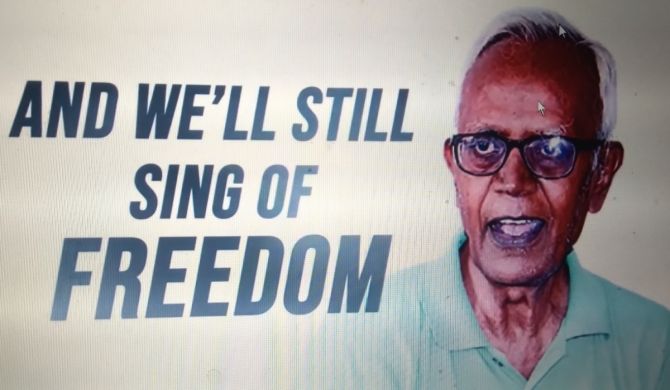
Though he was well looked after at the Holy Family Hospital, Father Stan's deep desire to go back and be with those he called 'My people' -- the Adivasis of Jharkhand -- remained unfulfilled till the end.
In an unusual move, the high court spoke directly with him through video conferencing on May 21.
That's when he told the judges he would prefer to die (external link) in prison if he wasn't allowed to go back to his 'friends' in Ranchi.
Just how close the Tamil Nadu-born, Manila-educated priest was to Adivasis was revealed by the three family members who spoke at the condolence meeting.
All of them said the same thing: Whenever Father Stan visited them, all he spoke about was the Adivasis among whom he lived.
"You could say he too was an Adivasi," said his niece's husband.
"What is the purpose of your life?" his niece's daughter Lincy recalled Father Stan asking her. "You will work, marry, have children and die." It was from him that they learnt the meaning of a life well-lived. "He certainly didn't deserve to die the way he did," she said.
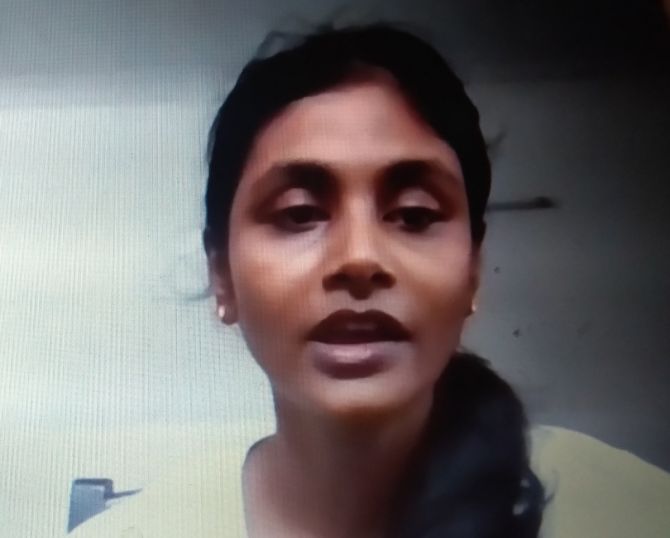
When Nandini Sundar, professor of sociology at the Delhi School of Economics, first approached Father Stan in 2003 for help in researching tenurial laws, he asked her sternly how her research would help Adivasis.
"I had no answer, but soon he relented and helped us a lot," she recalled. She met him often after that; "I feel so lucky to have known him," she told Rediff.com.
Father Stan didn't only fight for the Constitutional rights of the Adivasis to 'jal, jangal aur zameen' or help them learn about their rights. He also worked hard to document the indignities they were suffering.
He and tribal activist Gladston Dungdung painstakingly documented in 2010, the names and locations of the 88 schools in Jharkhand that had been taken over by the security forces as part of the UPA government's Operation Green Hunt against tribals.
Such a takeover deprived Adivasi children not only of education but also of the midday meal provided in schools, which was for many of them, the only proper meal they ate, Father Stan pointed out.
In 2014, at the age of 77, Father Stan documented the arrests and killings of Adivasis in Jharkhand from January 2011-August 2014.
According to Kavita Srivastava, President, PUCL, Rajasthan, "That's what got the government really upset. This study was filed as a PIL in the Ranchi high court. The government did not wish to be held accountable towards the falsely incarcerated prisoners."
In 2017, Father Stan joined the Persecuted Prisoners Solidarity Committee, formed to fight for Adivasis languishing in jail as undertrials.
Ironically, this dedication to Adivasis led Father Stan to finally become one such persecuted prisoner left to languish in jail as an undertrial.
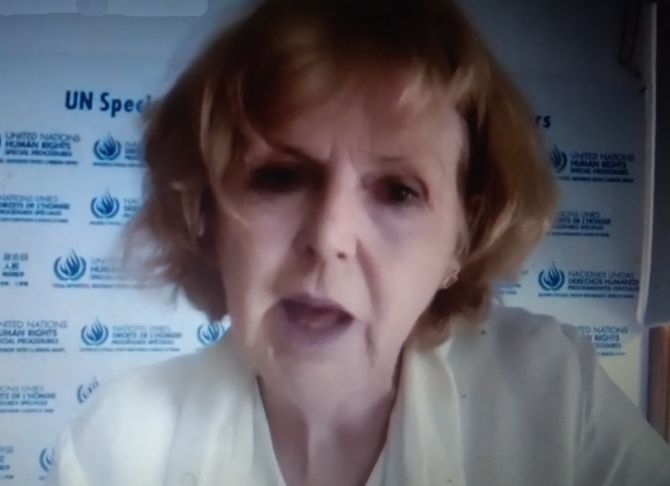
In August 2018, Jharkhand's then Bharatiya Janata Party government charged 81-year-old Father Stan and 19 other activists with sedition, and also under Section 66 A of the IT Act which had by then been struck down by the Supreme Court. The reason? His support to the Adivasis' 'Pathalgadi' movement.
The movement saw Adivasis erect stone plaques in their villages as a sign of their right to self-governance.
Erecting such plaques was their traditional custom of marking graves. After the PESA Act was passed in 1996, former IAS officer B D Sharma advised Adivasis to inscribe the provisions of the Constitution on these plaques.
In the Pathalgadi movement, the Adivasis inscribed the provisions of PESA on these plaques as a sign of opposition to the state government's moves to dilute this and other laws guaranteeing their rights over their land.
The movement's supporters also announced, quoting the Constitution, that government and mining company officials could not enter their villages without Gram Sabha's permission.
Father Stan's support to this powerful Adivasi resistance movement, which the State branded Maoist, finally led to his arrest in the Bhima Koregaon case.
Within nine months of his arrest, he passed away -- still a prisoner.
At the condolence meeting, office-bearers of international human rights organisations including the UN Special Rapporteur on Human Rights Mary Lawlor spoke of how unacceptable it was that a human rights defender like Fr Stan Swamy could be jailed in a democracy like India.
His death in custody was "a stain on the reputation of the Indian authorities which will last forever," said Lawlor.
Will this harsh condemnation make any difference to those who put Father Stan in jail?
Feature Presentation: Rajesh Alva/Rediff.com